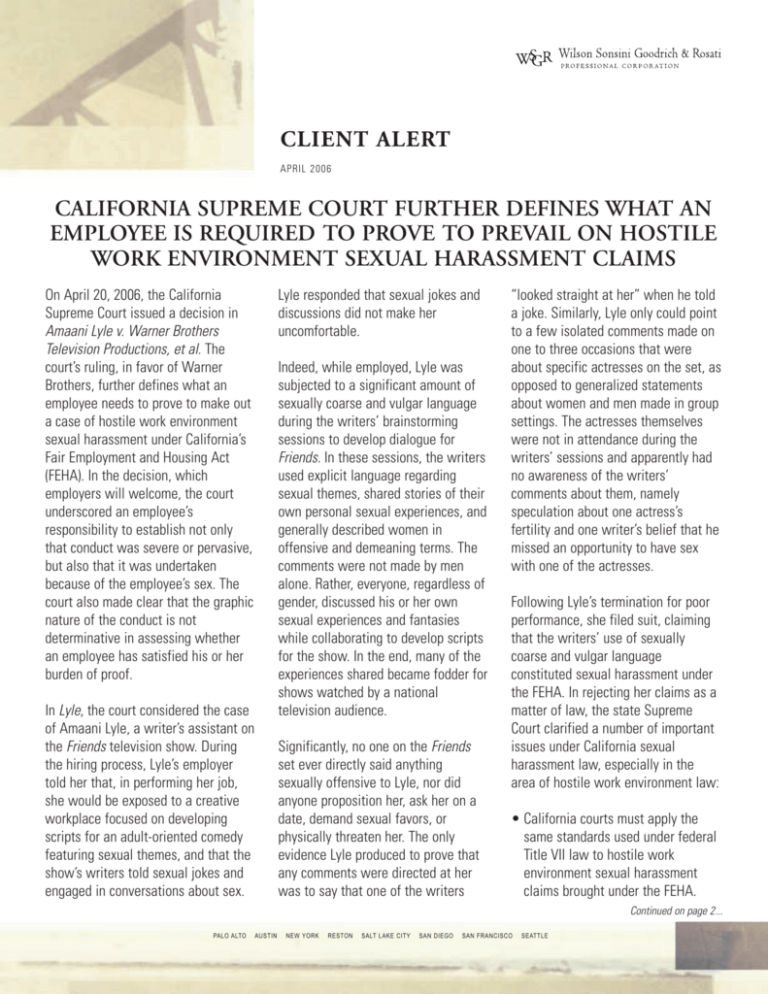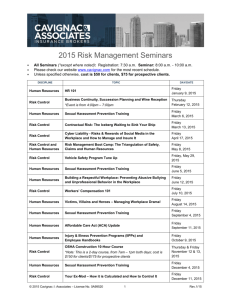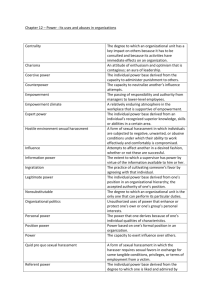
CLIENT ALERT
APRIL 2006
CALIFORNIA SUPREME COURT FURTHER DEFINES WHAT AN
EMPLOYEE IS REQUIRED TO PROVE TO PREVAIL ON HOSTILE
WORK ENVIRONMENT SEXUAL HARASSMENT CLAIMS
On April 20, 2006, the California
Supreme Court issued a decision in
Amaani Lyle v. Warner Brothers
Television Productions, et al. The
court’s ruling, in favor of Warner
Brothers, further defines what an
employee needs to prove to make out
a case of hostile work environment
sexual harassment under California’s
Fair Employment and Housing Act
(FEHA). In the decision, which
employers will welcome, the court
underscored an employee’s
responsibility to establish not only
that conduct was severe or pervasive,
but also that it was undertaken
because of the employee’s sex. The
court also made clear that the graphic
nature of the conduct is not
determinative in assessing whether
an employee has satisfied his or her
burden of proof.
Lyle responded that sexual jokes and
discussions did not make her
uncomfortable.
Indeed, while employed, Lyle was
subjected to a significant amount of
sexually coarse and vulgar language
during the writers’ brainstorming
sessions to develop dialogue for
Friends. In these sessions, the writers
used explicit language regarding
sexual themes, shared stories of their
own personal sexual experiences, and
generally described women in
offensive and demeaning terms. The
comments were not made by men
alone. Rather, everyone, regardless of
gender, discussed his or her own
sexual experiences and fantasies
while collaborating to develop scripts
for the show. In the end, many of the
experiences shared became fodder for
shows watched by a national
television audience.
In Lyle, the court considered the case
of Amaani Lyle, a writer’s assistant on
the Friends television show. During
the hiring process, Lyle’s employer
told her that, in performing her job,
she would be exposed to a creative
workplace focused on developing
scripts for an adult-oriented comedy
featuring sexual themes, and that the
show’s writers told sexual jokes and
engaged in conversations about sex.
Significantly, no one on the Friends
set ever directly said anything
sexually offensive to Lyle, nor did
anyone proposition her, ask her on a
date, demand sexual favors, or
physically threaten her. The only
evidence Lyle produced to prove that
any comments were directed at her
was to say that one of the writers
“looked straight at her” when he told
a joke. Similarly, Lyle only could point
to a few isolated comments made on
one to three occasions that were
about specific actresses on the set, as
opposed to generalized statements
about women and men made in group
settings. The actresses themselves
were not in attendance during the
writers’ sessions and apparently had
no awareness of the writers’
comments about them, namely
speculation about one actress’s
fertility and one writer’s belief that he
missed an opportunity to have sex
with one of the actresses.
Following Lyle’s termination for poor
performance, she filed suit, claiming
that the writers’ use of sexually
coarse and vulgar language
constituted sexual harassment under
the FEHA. In rejecting her claims as a
matter of law, the state Supreme
Court clarified a number of important
issues under California sexual
harassment law, especially in the
area of hostile work environment law:
• California courts must apply the
same standards used under federal
Title VII law to hostile work
environment sexual harassment
claims brought under the FEHA.
Continued on page 2...
PALO ALTO
AUSTIN
NEW YORK
RESTON
SALT LAKE CITY
SAN DIEGO
SAN FRANCISCO
SEATTLE
California Supreme Court Further Defines What an Employee Is Required to Prove . . .
Continued from page 1...
• The alleged conduct must be either
severe or pervasive and,
separately, “because of sex.”
• The graphic nature of the verbal
conduct and physical gestures is
not conclusive, as “[i]t is the
disparate treatment of an
employee on the basis of sex—not
the mere discussion of sex or use
of vulgar language—that is the
essence of a sexual harassment
claim.”
• When a plaintiff cannot point to a
loss of tangible job benefits, he or
she must make a “commensurately
higher showing that the sexually
harassing conduct was pervasive
and destructive of the working
environment.”
• Like Title VII, the FEHA is “not a
‘civility code’ and [is] not designed
to rid the workplace of vulgarity.”
The court specifically concluded that
a hostile work environment sexual
harassment claim is not established
in cases where a supervisor or
coworker uses vulgar or inappropriate
language in front of employees, or
draws sexual pictures, without
directing sex-based innuendos or
language toward a particular
employee or toward men or women
in general. Because the language
examined was not specifically
directed at Lyle, the court required
that she establish facts from which a
reasonable trier of fact could find
that the conduct permeated her work
environment and was pervasive and
destructive. Lyle conceded that none
of the offensive conduct was directed
PALO ALTO
at her and that the “nondirected”
conduct occurred during group
sessions, in which both men and
women were present and
participating in the vulgar and lewd
sexual conversations. Finally, because
Lyle only could point to fewer than
three sex-based comments made
about two of the Friends actresses,
the court found that such conduct
neither permeated her work
environment nor satisfied the
pervasive and destructive standard.
In Lyle, the court not only reexamined many important tenets of
hostile work environment sexual
harassment cases (already firmly
established under Title VII law), but
also analyzed the very graphic and
vulgar conduct in this case and found
no violation of sexual harassment
law. In doing so, the court certainly
has not given free reign for coarse
sex-based language in the workplace,
as the decision is based carefully on
the “totality of the undisputed
circumstances.” The context—the set
of Friends—is key here, for it is an
environment in which the nature of
the work itself required talking about
sex, as the “comedy writers were
paid to create scripts highlighting
adult-themed sexual humor and
jokes, and where members of both
sexes contributed and were exposed
to the creative process spawning
such humor and jokes.” Few
employers will fit into the Friends
mold.
party, but instead made the
comments and simulated the lewd
acts in a group setting, with both
men and women present. The same
allegations examined by the court in
this case could well establish
actionable harassment under
different (and, perhaps, more
common) circumstances, particularly
if that language were directed
toward a particular employee or
group of employees of the same
gender. Thus, while Lyle is a
significant win for employers, and
surely establishes that the FEHA is
“not a ‘civility code’ and [is] not
designed to rid the workplace of
vulgarity,” the decision does not
grant employers a license to allow
coarse and vulgar sexual conduct by
employees in the workplace without
risk of facing an actionable hostile
environment claim.
This Client Alert was sent to our clients and
interested parties via email on
April 26, 2006. To receive future Client
Alerts and newsletters via email, please
contact Marketing at
wsgr_resource@wsgr.com
and ask to be added to our mailing list.
This communication is provided for your
information only and is not intended to
constitute professional advice as to any
particular situation.
650 Page Mill Road
Palo Alto, CA 94304-1050
Tel: (650) 493-9300 Fax: (650) 493-6811
email: wsgr_resource@wsgr.com
www.wsgr.com
Additionally, the court emphasized
that the writers did not direct the
alleged offensive language and
conduct toward the complaining
AUSTIN
NEW YORK
RESTON
SAN DIEGO
SALT LAKE CITY
© 2006 Wilson Sonsini Goodrich & Rosati,
Professional Corporation
All rights reserved.
SAN FRANCISCO
SEATTLE
2







